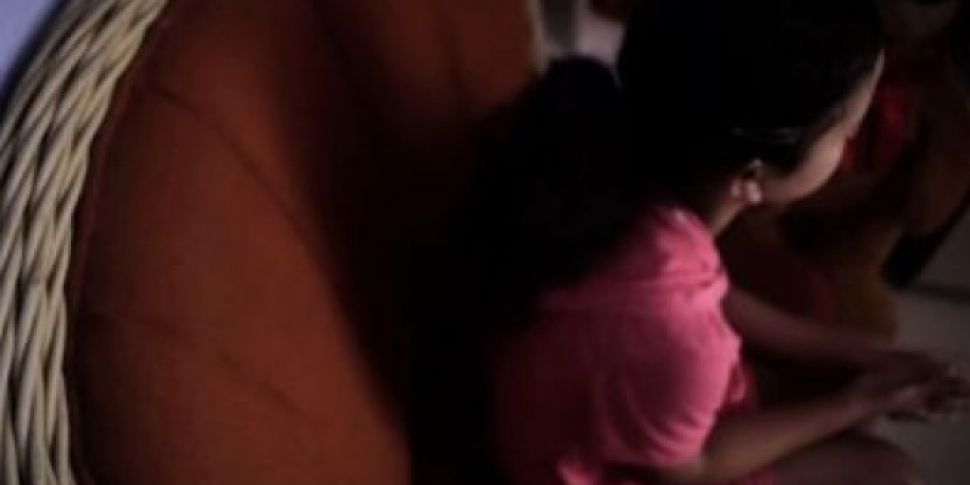Authorities in the Philippines have warned the sexual exploitation of children online is a "growing trend", despite ramped-up global efforts to rescue minors from abuse.
Attorney Janet Morecho-Francisco, from the Philippines National Bureau of Investigation (NBI), said recent operations have indicated the involvement of families and neighbours in the abuse is occurring in more places than previously thought, and that thousands of children are still being exploited.
"It's a growing trend. More and more families are engaging in these illegal activities, because it is the easiest way for them to have an income.
"This is really the reason why it has been a cottage industry in some areas."
In footage of a joint raid conducted by the NBI and FBI in Taguig City, children rescued by the agents are heard crying out for their mother, despite her being suspected of having facilitated their abuse in exchange for payment from foreign paedophiles.
"Since these children are groomed as young as one-year-old, they think what they are doing is just normal, so they are able to act as if it is right," said Attorney Morecho-Fransciso.
While the problem of child online exploitation in the Philippines has been making headlines for years, there is mounting evidence the issue is getting worse.
"Almost every week we have girls who come here to the charity"
Sky News visited the Centre for Hope, run by the Visayan Forum, which provides secure accommodation, schooling and counselling for about 50 children rescued from sexual abuse.
The charity's resources are being stretched to the limit as newly rescued children arrive in ever increasing numbers.
"Two weeks ago we had 17 girls who were just rescued, but we could not accommodate them because we are already full, so we put them in a different shelter," said Cecilia Flores-Oebanda, executive director of Visayan Forum.
"Almost every week we have girls who come here... I try to hide my emotion when talking to them, but when I get home I really cry, I really pour out my heart. Talking to these young girls, how broken they are, how traumatised they are, it's unacceptable."
In interviews conducted with a social worker present, some of the girls told Sky News about the abuse they suffered.
"As soon as I woke up, I would be there in front of the camera, and they would do unpleasant things to me," said a 17-year-old girl, who was abused from the age of 12.
"My neighbour would put me in front of the camera and take a picture of me naked. Then they'd take me to different places to meet the customers.
"They came from different countries like America, London, and Australia."
A 13-year-old girl, rescued a year ago, described how she had been abused since she was eight.
Asked whether she knew at the time that what was being done to her was wrong, she answered: "I didn't. I thought what they were doing to me was normal."
Although international cooperation amongst law enforcement agencies from the US, UK, Australia and across Europe has resulted in a growing number of arrests, Dutch charity Terre De Hommes believes confronting the ever-growing demand for child sexual content on the internet must be intensified.
Meet Sweetie 2.0 - the paedophile snare chatbot that talks to people online and gathers data if they are suspicious https://t.co/cmTbpZYAwC pic.twitter.com/Qo3XwHblbo
— Sky News (@SkyNews) March 19, 2017
In 2013 they launched the Sweetie programme - an automated chat-bot and webcam avatar that could automatically communicate with and gather the data of suspected paedophiles on public chatrooms.
This spring they will launch Sweetie 2.0, the latest version of the system which has become increasingly sophisticated, and capable of conducting hundreds of automated chats at once.In the course of these chats certain 'red flags' are identified, such as showing an interest in sexual interaction, an acknowledgement that the child they believe they are speaking to is 10 or 11-years-old, and the offering up of an email or Skype address.
The system then compiles a list of 'persons of interest'.
Programme director Hans Guijit told Sky News the ultimate aim is for the Sweetie programme to become a tool for law enforcement agencies to send mass warning messages to online predators as a deterrent.
"Once you remove that blanket of anonymity and say 'I know who you are, I know what you want' then you will have that shock effect. No one is making enough effort to remove that blanket, we are the first."
While a simple deterrent message may seem like a light response, Mr Guijit points out the FBI believes up to 750,000 online users are searching for child sexual content at any given moment globally, meaning it would be "impossible to arrest our way out of this".









